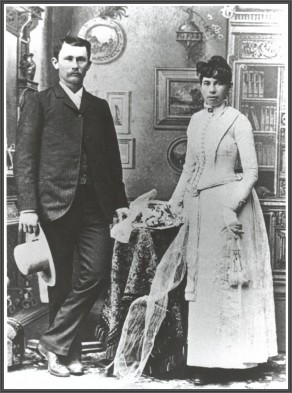Many clients call us and want to know about DNA tests for genealogy purposes. Genealogy DNA testing is a wonderful new tool for connecting to your living cousins, and potentially to your common ancestors. The use of DNA testing for family history began about twenty years ago, and has improved significantly through the years. The test sample is taken from saliva. A kit is ordered online and sent to the subject by the testing company.
It is important to know that there are three types of genealogy DNA tests. They are:
• The Y-DNA test, done on male subjects only, is for determining their direct paternal ancestry. This is a very valuable test for tracing a particular surname line. Females do not have a Y chromosome, so this test will not trace a lineage that goes through a female ancestor. The only company that currently performs the Y-DNA test for genealogical purposes is FamilyTreeDNA.com. Ancestry.com does not offer this test, nor does 23anMe.com. The costs increase with the number of DNA markers tested. A 12 marker test will give many matches, but more markers tested will narrow down the field to close matches. The marker levels are 12, 25, 37, 67, and 111. We recommend testing for at least 67 markers.
• The mitochondrial DNA (mtDNA) test traces the female lineage, daughter to mother to grandmother to great-grandmother, and so forth. Females are the stab ilizing forces of a society. They are more likely to stay around their own parents and children, while historically, men sometimes wandered. MtDNA is especially helpful in studying migration patterns of ancient tribes or ethnicities. It can also be useful in determining a generational connection a few decades back. The only company that currently performs the Y-DNA test for genealogical purposes is FamilyTreeDNA.com. Ancestry.com does not offer this test. Neither does 23andMe.com
ilizing forces of a society. They are more likely to stay around their own parents and children, while historically, men sometimes wandered. MtDNA is especially helpful in studying migration patterns of ancient tribes or ethnicities. It can also be useful in determining a generational connection a few decades back. The only company that currently performs the Y-DNA test for genealogical purposes is FamilyTreeDNA.com. Ancestry.com does not offer this test. Neither does 23andMe.com
• The autosomal DNA test takes in all of your chromosomal DNA. The results are broad and non-specific, but can still be beneficial in linking you to distant cousins, who may have more documented research than you do on your common ancestors. This is the only test that Ancestry.com does, and also the test that 23andMe.com uses. FamilyTreeDNA.com offers this test, which they call Family Finder.
Heritage Consulting recommends FamilyTreeDNA.com for all genealogy DNA testing. When a subject submits a sample, for one of the three types of tests offered by this company, they retain the sample. That way, if a subject wants to have one of the other tests done, the company already has a sample to test. If a Y-DNA test subject wants to upgrade to more markers in order to narrow down close matches, the lab can use the same test kit. FamilyTreeDNA.com will allow their test results to be uploaded to the databases of the other two companies, Ancestry.com and 23andMe.com. This allows a test subject to compare their results with a larger field of samples. But those two companies do not allow their test results to be shared with FamilyTreeDNA.com. This is another reason to go with FamilyTreeDNA.com, the only company that offers all three tests for genealogy DNA matches.
In future blog posts, I will give examples from our client research of how DNA testing has provided crucial information.
Raquel Lindaas, AG®
Heritage Consulting
It is important to know that there are three types of genealogy DNA tests. They are:
• The Y-DNA test, done on male subjects only, is for determining their direct paternal ancestry. This is a very valuable test for tracing a particular surname line. Females do not have a Y chromosome, so this test will not trace a lineage that goes through a female ancestor. The only company that currently performs the Y-DNA test for genealogical purposes is FamilyTreeDNA.com. Ancestry.com does not offer this test, nor does 23anMe.com. The costs increase with the number of DNA markers tested. A 12 marker test will give many matches, but more markers tested will narrow down the field to close matches. The marker levels are 12, 25, 37, 67, and 111. We recommend testing for at least 67 markers.
• The mitochondrial DNA (mtDNA) test traces the female lineage, daughter to mother to grandmother to great-grandmother, and so forth. Females are the stab
 ilizing forces of a society. They are more likely to stay around their own parents and children, while historically, men sometimes wandered. MtDNA is especially helpful in studying migration patterns of ancient tribes or ethnicities. It can also be useful in determining a generational connection a few decades back. The only company that currently performs the Y-DNA test for genealogical purposes is FamilyTreeDNA.com. Ancestry.com does not offer this test. Neither does 23andMe.com
ilizing forces of a society. They are more likely to stay around their own parents and children, while historically, men sometimes wandered. MtDNA is especially helpful in studying migration patterns of ancient tribes or ethnicities. It can also be useful in determining a generational connection a few decades back. The only company that currently performs the Y-DNA test for genealogical purposes is FamilyTreeDNA.com. Ancestry.com does not offer this test. Neither does 23andMe.com• The autosomal DNA test takes in all of your chromosomal DNA. The results are broad and non-specific, but can still be beneficial in linking you to distant cousins, who may have more documented research than you do on your common ancestors. This is the only test that Ancestry.com does, and also the test that 23andMe.com uses. FamilyTreeDNA.com offers this test, which they call Family Finder.
Heritage Consulting recommends FamilyTreeDNA.com for all genealogy DNA testing. When a subject submits a sample, for one of the three types of tests offered by this company, they retain the sample. That way, if a subject wants to have one of the other tests done, the company already has a sample to test. If a Y-DNA test subject wants to upgrade to more markers in order to narrow down close matches, the lab can use the same test kit. FamilyTreeDNA.com will allow their test results to be uploaded to the databases of the other two companies, Ancestry.com and 23andMe.com. This allows a test subject to compare their results with a larger field of samples. But those two companies do not allow their test results to be shared with FamilyTreeDNA.com. This is another reason to go with FamilyTreeDNA.com, the only company that offers all three tests for genealogy DNA matches.
In future blog posts, I will give examples from our client research of how DNA testing has provided crucial information.
Raquel Lindaas, AG®
Heritage Consulting





